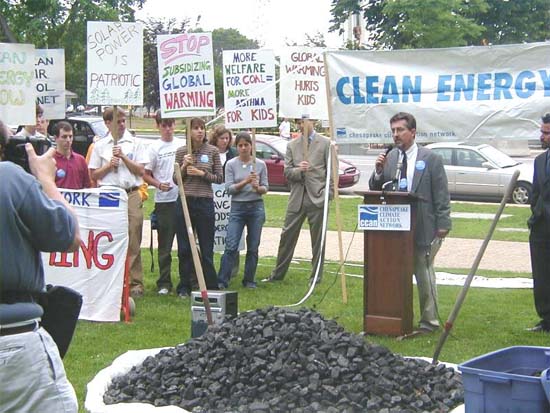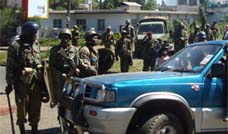
"It’s never been a better time for Americans to think about alternatives to home energy and certainly home energy fuel,” he said. ‘‘... Because of climate change and increasingly [depleted] oil and natural gas supplies worldwide and our national security, there are always abundant reasons to seek out alternatives to fossil fuels.” Tidwell said families from as far away as Greenbelt and Bethesda have joined the co-op, which started with just 12 members. Though corn prices have risen somewhat because of an increasing demand for corn ethanol, Tidwell said it is still cheaper than natural gas. ‘‘We still save money; we just don’t save as much,” he said. Author Mike Tidwell, founder of the Chesapeake Climate Action Committee, served as a Peace Corps Volunteer in Congo Kinshasa.
Mike Tidwell helped start corn stoves co-op
Warming up to the idea of corn stoves?
Some say the alternative ‘green’ way of heating homes is the least expensive
by Mike Meno | Staff Writer
For the past five years, a group of area residents have heated their homes with stoves that burn corn, an energy source they say is cheaper and more environmentally friendly than gas, oil or electricity, and one they hope others also will use.
Almost 70 families in the Takoma Park⁄Silver Spring Cornburners Cooperative use corn-burning stoves that produce a clean-burning fuel to heat their homes in an effort to reduce carbon dioxide emissions and fight global warming. For the past five years, they have used a 25-foot granary in Takoma Park that holds 21 tons of corn.
‘‘I thought it was a good idea because we have an old house that’s very drafty and very expensive to heat with gas,” said Takoma Park resident Thom Wolf, a member of the co-op who owns two corn-burning stoves.
Wolf said he spends between $125 to $150 a month on enough corn to heat his house — compared to the $600 a month he said he paid before getting the corn stove.
‘‘We hardly ever turn the gas on now,” he said. ‘‘Most of the time we use the corn stoves. They work real well.”
Mike Tidwell, a Takoma Park resident and the founder and director of the Chesapeake Climate Action Network, a nonprofit that raises awareness about global warming, helped start the co-op.
‘‘It’s never been a better time for Americans to think about alternatives to home energy and certainly home energy fuel,” he said. ‘‘... Because of climate change and increasingly [depleted] oil and natural gas supplies worldwide and our national security, there are always abundant reasons to seek out alternatives to fossil fuels.”
Tidwell said families from as far away as Greenbelt and Bethesda have joined the co-op, which started with just 12 members.
Though corn prices have risen somewhat because of an increasing demand for corn ethanol, Tidwell said it is still cheaper than natural gas.
‘‘We still save money; we just don’t save as much,” he said.
Three years ago, a ton of corn cost $130, he said. This year it is about $170.
He said the corn is bought from area farmers and is shelled, organically fertilized, grown in soil without sand, clay and gravel, and is not genetically modified.
The stoves can be purchased online or at certain home, hardware, fireplace and farming supply stores. Depending on sizes and models, costs can range from $800 to $2,000.
Tidwell hopes other communities would follow Takoma Park’s model, which was the first in the country. He said work is under way to install a corn granary for home use in Mount Rainier.
Tidwell said there is also ‘‘dramatic promise” in burning switch grass, a seasonal grass that he said has been used as a fuel in the Midwest and is native to Maryland. Corn stoves can burn any biomass in pellet form, Tidwell said, and switch grass can be made into pellets.
‘‘Switch grass is going to play a big role in our energy future,” he said.
But Tidwell also said that while changes on the local level are good, the only way to reduce carbon emissions on a widespread scale is for people to petition state and federal representatives.
‘‘The most important thing every American can do is make a green phone call,” he said.
Comparing fuel costs
Electricity: Average monthly bill for Pepco customers who get all their energy from electricity: $183
Oil: Average cost to fill a 150-gallon oil tank: $510.34 (at present rate of $3.34 a gallon)
Natural gas: Average bill for Washington Gas customers last winter: $1,000
Corn: Average monthly amount bought to heat house in winter: $130
Sources: Washington Gas, Pepco, Burtonsville Fuel, Takoma Park⁄Silver Spring Cornburners Cooperative









